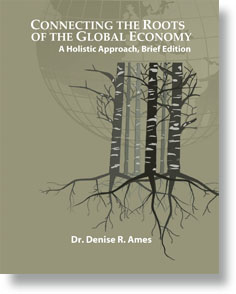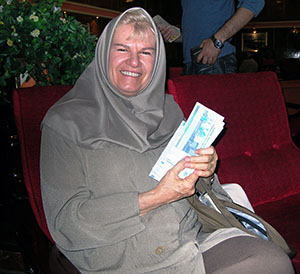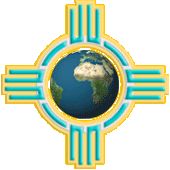Connecting the Roots of the Global Economy:
A Holistic Approach, Brief Edition
By Dr. Denise R. Ames
This brief edition of The Global Economy helps sort out the confusing and overwhelming economic events that are directly affecting you, your future, and the lives of those around you.

Book
2015, 215 pgs.Illustrated, index, glossary, source notes, bibliography, and graphic organizers.
$16.95
E-Reader (PDF)
$13.95
Gather Conversation Guide
Email: info@global-awareness.org for FREE, on-line GATHER Resources(Global Awareness Adult Conversations and Study Groups)
Educator Resources
Include puzzles, questions, and power point presentations.
This book is for adult learners, educators, students (9-university). Each chapter includes "Questions to Consider," spurring critical thinking and "seeing" the information differently.
Are you confused about the workings of the global economy? Why is the middle class in the U.S. shrinking? Why are the top 1% and 20% doing so well while the bottom 80% experience stagnant wages?
This brief edition explaining the global economy helps sort out the confusing and overwhelming economic events that are directly affecting you, your future, and the lives of those around you. Once we have a better understanding of how the global economy works, we are better equipped to critique it, see the fault lines, and propose solutions.
The Global Economy was a hit in Dr. Julia Reyes’ class at Metro State University in Denver, CO.
A few student comments:
"It is a very powerful read, overall, an absolutely fantastic read."
"It was organized, well written, and constantly assured the person unaware of the complexity of our world economics they were not the only people confused. I personally needed that reassurance."
"This book could be used to teach basic world economics, or just essential information for all people trying to understand our complex world economic situation."
Table of Contents

Chapter 1. An Overview of the Global Economy
Chapter 2. Historical Roots of the Global Economy
Chapter 3. The Neoliberal Stew: A Dozen Essential Ingredients
Chapter 4. The Impact of Neoliberalism in the United States: Ten Consequences
Chapter 5. The Economic Globalization Puzzle: Ten Pieces
Chapter 6. The Impact of Economic Globalization
Chapter 7. The Financial Sector: Ten Fatal Flaws
Chapter 8. The Financial Sector: Crisis and its Aftermath
A Note from the Author … Dr. Denise R. Ames
I have always had a fascination with how and why the economy works as it does. When I began my research and teaching of world history in the early 1990s, I found that the economy changed over time like other cultural patterns. My encounters with the then Soviet Union in 1989 and the simple Amish communities in central Illinois also sparked my interest in how these alternative economies worked compared to our capitalist system.

With the formation of our non-profit organization, the Center for Global Awareness, I was finally able to put together all my thoughts and research into a book on the global economy. Since I am a historian, not an economist, I wanted to look at the global economy from an outside perspective and examine the real workings of the economy, not the ideal version presented in many economic classes.
My intention in writing this book is to give a critique of the capitalist system as it functions today. Since I don’t feel that the system is working very well for the vast majority of the world’s population or for the environment, I want to convey this message in a non-confrontational way. We need another perspective. The ultimate goal is for readers to come to their own conclusions about whether the global economy is working well for them, their family, their locality, their nation, and the world community.
I have found that there are very few books giving a general overview and realistic portrayal of the global economy in a holistic way. After an overview of terms and concepts and the historical roots of the economic system, three dimensions of the global economy are explored: neoliberalism (free market capitalism), economic globalization and financialization. The final chapter makes recommendations for change.
Since I have witnessed many of the changes that have taken place, I will chronicle some of my experiences and reflection in this book to give you a personal account of the changes that have taken place. I encourage you to do the same. Ask others you know about what they have experienced. You are bound to get interesting insights and a wide reaction to the events. Everyone has his or her own story.

